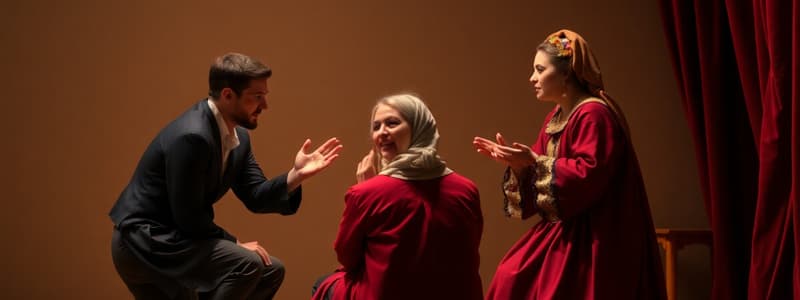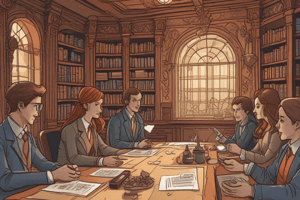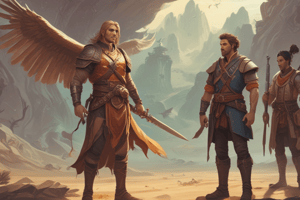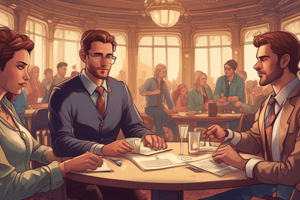Podcast
Questions and Answers
What was a significant aspect of role play in early human societies?
What was a significant aspect of role play in early human societies?
- It was mainly a form of entertainment without serious meaning.
- It was primarily used for educational purposes.
- It was a key element of religious and cultural rituals. (correct)
- It developed as a theatrical art form quickly.
Which playwright is noted for advancing dramatic roleplay during the Renaissance?
Which playwright is noted for advancing dramatic roleplay during the Renaissance?
- Molière
- Tennessee Williams
- Arthur Miller
- William Shakespeare (correct)
What role did military simulations play in the 19th century?
What role did military simulations play in the 19th century?
- They were primarily focused on entertainment.
- They were used to teach morality and ethics.
- They served strategic significance in training. (correct)
- They focused on psychological exploration of soldiers.
Which method did Jacob L. Moreno develop for therapeutic purposes?
Which method did Jacob L. Moreno develop for therapeutic purposes?
What characterized the roleplay methods used in the Middle Ages?
What characterized the roleplay methods used in the Middle Ages?
Which roleplaying trend became prominent in the 21st century?
Which roleplaying trend became prominent in the 21st century?
How did roleplaying games (RPGs) change in the 1970s?
How did roleplaying games (RPGs) change in the 1970s?
What type of roleplay activities are associated with pop culture in the 21st century?
What type of roleplay activities are associated with pop culture in the 21st century?
What is the main advantage of role-playing in therapy and counseling?
What is the main advantage of role-playing in therapy and counseling?
Which of the following is NOT a type of role play mentioned?
Which of the following is NOT a type of role play mentioned?
What is a key characteristic of tabletop roleplaying games (TTRPGs)?
What is a key characteristic of tabletop roleplaying games (TTRPGs)?
Which role play type involves real-time interaction with shorter replies?
Which role play type involves real-time interaction with shorter replies?
What role-play scenario might help students in a finance class?
What role-play scenario might help students in a finance class?
What benefit does role play provide regarding empathy?
What benefit does role play provide regarding empathy?
Which example illustrates a scenario of live action role-playing (LARP)?
Which example illustrates a scenario of live action role-playing (LARP)?
How does role-playing enhance problem-solving skills?
How does role-playing enhance problem-solving skills?
Which of the following is a common feature of online role play?
Which of the following is a common feature of online role play?
What is a significant benefit of role play in education?
What is a significant benefit of role play in education?
Which tabletop RPG focuses on character-driven storytelling with minimal rules?
Which tabletop RPG focuses on character-driven storytelling with minimal rules?
In which role-play activity might students practice as a family therapist?
In which role-play activity might students practice as a family therapist?
What outcome relates to improved communication in role play?
What outcome relates to improved communication in role play?
Which type of role play is likely to involve detailed posts and asynchronous participation?
Which type of role play is likely to involve detailed posts and asynchronous participation?
Flashcards
Role-Play
Role-Play
A teaching method where participants take on assigned roles and act out scenarios to learn through experience.
Individual Role-Play
Individual Role-Play
A type of role-play where one person acts out a scenario with an instructor or therapist.
Group Role-Play
Group Role-Play
Multiple people play roles in a single scenario, often working together to achieve a shared goal.
Ritualistic Roleplay
Ritualistic Roleplay
Signup and view all the flashcards
Theatrical Beginnings of Role-Play
Theatrical Beginnings of Role-Play
Signup and view all the flashcards
Religious and Moral Role-Play in the Middle Ages
Religious and Moral Role-Play in the Middle Ages
Signup and view all the flashcards
Knightly Training using Role-Play
Knightly Training using Role-Play
Signup and view all the flashcards
Dramatic Roleplay in the Renaissance
Dramatic Roleplay in the Renaissance
Signup and view all the flashcards
What is Tabletop Roleplaying (TTRPGs)?
What is Tabletop Roleplaying (TTRPGs)?
Signup and view all the flashcards
What is Dungeons & Dragons (D&D)?
What is Dungeons & Dragons (D&D)?
Signup and view all the flashcards
What is Live Action Role-Playing (LARP)?
What is Live Action Role-Playing (LARP)?
Signup and view all the flashcards
What is Online/Text-Based Roleplay (Text RP)?
What is Online/Text-Based Roleplay (Text RP)?
Signup and view all the flashcards
What is Role-Playing in Education?
What is Role-Playing in Education?
Signup and view all the flashcards
What is Role-playing in Therapy and Counseling?
What is Role-playing in Therapy and Counseling?
Signup and view all the flashcards
What is a benefit of role-playing?
What is a benefit of role-playing?
Signup and view all the flashcards
What is another benefit of role-playing?
What is another benefit of role-playing?
Signup and view all the flashcards
What is another benefit of role-playing?
What is another benefit of role-playing?
Signup and view all the flashcards
What is another benefit of role-playing?
What is another benefit of role-playing?
Signup and view all the flashcards
What is typical role-playing?
What is typical role-playing?
Signup and view all the flashcards
What is Fate Core?
What is Fate Core?
Signup and view all the flashcards
What is Cyberpunk RED?
What is Cyberpunk RED?
Signup and view all the flashcards
What is Bicolline?
What is Bicolline?
Signup and view all the flashcards
What is Vampire: The Masquerade?
What is Vampire: The Masquerade?
Signup and view all the flashcards
Study Notes
Role-Playing: A Historical Overview
- Role-playing is an experiential learning technique where participants assume assigned roles and enact scenarios.
- It can be individual or involve multiple participants in a group.
- Role-playing has been used across different eras and cultures.
Ancient Times
- In early human societies, role-playing was integral to religious and cultural rituals.
- Ancient Greek theater, born from religious festivals, laid groundwork for dramatic role-play.
The Middle Ages (5th - 15th Century)
- Mystery and morality plays exemplified the use of role-play in teaching biblical stories and moral lessons.
- Role-playing was employed in knightly training to simulate practical scenarios.
Renaissance and Enlightenment (16th - 18th Century)
- Renaissance theater underscored realistic character portrayals, with playwrights like Shakespeare enhancing dramatic role-playing.
- Courtly life incorporated elaborate role-play through games like masquerade balls.
The 19th Century
- Role-playing took on strategic significance in military training through war games.
- Early psychology began using role-play to assess patient behaviours and emotional responses, contributing to therapeutic practices.
The 20th Century
- Jacob L. Moreno's Psychodrama (1920s) utilized role-play for emotional processing and conflict resolution.
- Modern role-playing games (RPGs) emerged in the 1970s, like Dungeons & Dragons.
- Role-playing became crucial for training in professional development (e.g., customer service, negotiation).
The 21st Century
- Digital role-play communities thrived online, creating shared story spaces.
- Pop culture embraced LARP (Live Action Role-Playing) and cosplay.
- Role-playing remains valuable in therapy, education, and corporate training.
Kinds of Role Play
-
Tabletop Roleplaying (TTRPGs): Collaborative storytelling through dialogue and decision-making, often with structured rules and dice.
- Popular Examples: Dungeons & Dragons (D&D), Pathfinder, Cyberpunk RED, Fate Core.
-
Live Action Role-Playing (LARP): Immersive activity where participants physically enact roles in a fictional or historical setting.
- Popular Examples: Bicolline (Canada), Vampire: The Masquerade, College of Wizardry (Poland), Empire (UK).
-
Online/Text-Based Roleplay (Text RP): Storytelling through written text in online spaces like forums and chatrooms.
- Types: Forum Roleplay, Chatroom Roleplay, Group Roleplay.
-
Role-Playing in Education: A teaching strategy using simulated real-world situations to practice skills.
- Methods: Individual role-play, Group role-play, Online role-play.
-
Role-Playing in Therapy and Counseling: Therapeutic technique for practicing coping mechanisms and exploring different interactions in a controlled environment.
- Benefits: Safe practice, improved communication, emotional regulation, behavioral change.
Benefits of Role-Playing
- Enhanced creativity, improved communication, empathy, problem-solving, stress relief, and fun.
Studying That Suits You
Use AI to generate personalized quizzes and flashcards to suit your learning preferences.



